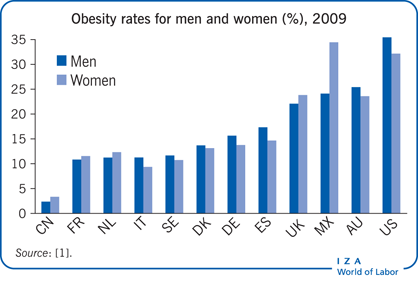Elevator pitch
Rising obesity is not only a pressing global public health problem. There is also substantial evidence that obese people, particularly women, are less likely to be employed and, when employed, are likely to earn lower wages. There is some evidence that the lower earnings are a result of discriminatory hiring and sorting into jobs with less customer contact. Understanding whether obesity is associated with adverse labor market outcomes and ascertaining the source of these outcomes are essential for designing effective public policy.
Key findings
Pros
Studies for the US and multiple European countries find a negative and statistically significant effect of obesity on earnings and employment.
There is some evidence that obesity reduces prospects for employment.
Studies have found that obese people face discrimination in the labor market, either taste-based or statistical discrimination.
One of the most robust findings is that obese white women generally earn less than their non-obese counterparts, even after controlling for other factors.
There is evidence that obese workers suffer from customer discrimination, which might keep obese people from being hired to fill certain types of jobs.
Cons
Data sets drawn from survey data with information on labor market outcomes often have weak coverage of health issues, so obesity measurements may not be accurate enough for rigorous statistical studies.
Despite strong correlations between obesity and adverse labor market outcomes, causality has not been definitively demonstrated—and the direction of causality could run from lower wages to obesity.
It is possible that there is no causal relationship in either direction, and that a third factor is linked to both obesity and labor market outcomes.
Information is lacking to determine whether lower wages, particularly for obese women, are due to employers’ dislike of obese people, statistical discrimination, or real differences in productivity.
